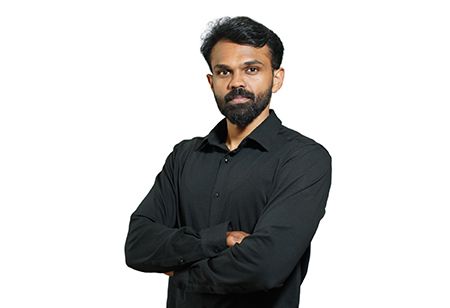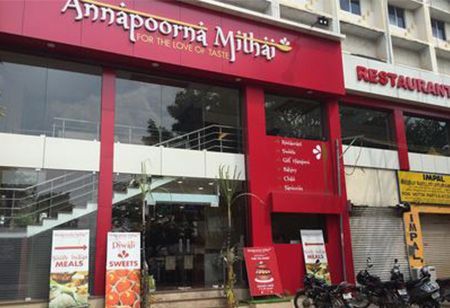
How Arulsujanesh Turned Failures to Success Flavors: The Annapoorna Mithai Story

 Arulsujanesh GK, Founder & Managing Director, Annapoorna Mithai is a civil engineer turned restaurateur who crafted a 'sweet' success story with his persistence.
Arulsujanesh GK, Founder & Managing Director, Annapoorna Mithai is a civil engineer turned restaurateur who crafted a 'sweet' success story with his persistence.
When failures came his way, Arulsujanesh converted them into sweet flavors of his success. Walking out with a civil engineering degree, Arulsujanesh was often turned down in interviews based on needing more practical knowledge in the field. However, he landed his first job as an apprentice in Arvia Constructions Pvt Ltd, Nungambakkam, Chennai. To this date, Arulsujanesh considers Mr.Nambi, his then-interviewer from Arvia Constructions, who encouraged him to step out and explore rewarding opportunities, to be one of his best mentors. He got his first paying job at Navins, which exposed him to two kinds of leadership experiences: the good and the bad. He then moved to Kaleesuwari Refinery Private Limited, Kakinada, Andhra Pradesh, for a year and a half, and learned that a leader is the one who leads the team and people don’t follow bosses. Let's hear the rest of the anecdote from him.
As a civil engineer turned restaurateur, tell us how you emerged as a leader driving Annapoorna Mithai's success today.
In truth, one call from my father changed the direction of my whole career from civil engineering to the restaurant business. Although I shared a passion for civil engineering, I took the reins of my family business—a restaurant called Annapoorna in Karaikudi, obliging to my father's request. I initially had a few hiccups around workforce management, task delegation, and the language barrier, but I soon grasped how to handle people thanks to what I learned from Kaleesuwari Refinery. To date, I have retained most of the staff, including our chefs, team members, and still counting, who have been there since the inception of Annapoorna Mithai. To that, I remain grateful for all the leadership lessons from the past.
Being a third-generation entrepreneur, what was your idea of making Annapoorna Mithai a unique brand in the market?
As third-generation entrepreneurs, our first thought was to move from our native, Karaikudi, to Madurai. We opened a vegetarian restaurant in Madurai and wanted to do something unique—a restaurant that caters to z vegetarian cuisines across India. Much research and development ensued, leading to a turning point that required me to unlearn and relearn. I got guidance from my mentors, such as Mr. Rajiv Talreja, Mr. Karan Hasija and Aditee, who taught me how to run a Business automated and profitable.
How do you strike a delicate balance between taste, nutrition and wellness?
I will tell you a story. One day, a bunch of FSSAI (Food Safety and Standards Authority of India) officers seized my sweets and savories on account of them being harmful for consumption. Bewildered, I ardently researched for answers and realized that it’s illegal to use artificial colors and flavors. But later, I discovered that the food industry had been largely engulfed in artificial colors, flavors and essence, despite government regulations. We eat to live, and food is meant for that, but the food industry often considers it a cash-making mechanism. The industry produces instantly edible food with little to no nutritional value. It makes food that tastes and smells good and is visually pleasing as well. The smell and visual appeal consist of only a few natural ingredients, with the rest being lab-tested synthetic essence, which clearly never goes towards internal wellness.
This is the huge gap I saw, and I decided to come up with a brand that is mindful of the nutrition and wellness of the customer, while it should serve profitability to the business as well.
With that, I set out to prove that business success is possible through both nutrition and commercial aspects.
What makes you win over customers, and what is your success mantra?
It took some time, but I must say, we do have a good customer base, especially the regulars who have been with us from the start. From what I observed, good food can never cover up bad service. That’s why the dining experience is of utmost importance. Here, I’d like to mention the performance metrics we follow for our service captains. We measure their performance based on the quality of service rendered, not the number of sales achieved. Now, if I were to measure my staff by sales, they would also view the customers as commercial cash machines. Hence, our rule of thumb is about the value my staff brings to the customers. As a result, it ensures not only that the customer has a pleasurable dining experience but also value for their money.
I would say persistence is my mantra. Persistence is like the blood in your veins. It keeps you going no matter what. Secondly, it’s all about learning. Start learning and continue until you can implement what you’ve learned.
What is the next chapter you are excited about for Annapoorna Mithai?
Currently we are doing B2C (Business-to-consumer) and looking to carter D2C (Direct-to-Consumer). We are building a website to cater to pan India and beyond. We want to ensure that people benefit from our products in a hygienic and nutritional manner.
Could you share some advice for future leaders in this industry from your experience?
Firstly, I’d like to raise a few touchpoints for the food industry. People looking to enter the food industry often perceive the business as profitable immediately. But like every industry, you need to learn about this industry before you enter. It’s well and good if you have basic experience as well. In my case, I had enough knowledge and experience, thanks to my family background, but I didn’t put my mind into the business part of food. Only later did I have to learn it in a scalable and implementable way. Also, I didn’t foresee whether my outlet could prosper elsewhere. That’s where I was wrong in the beginning.
I’d say, there are a lot of institutes to teach you about catering, providing services and cooking dishes, but none teaches you how to build a restaurant, food manufacturing brand or even the basics of it.
Therefore, leaders should get out there and learn from the experts or pioneers in this industry. If you wish to open a tea stall, work in a street-style stall where the business is successful. Understand the location, the customers, the commercial side, and the vendors. Understand how the business is being handled and then start your own. Learn and implement it. Take failure as a good step, learn from it and get out of it. That’s why I always say persistence is a must.